Poggio Bracciolini (1380-1459) recorded a tale about an uneducated priest who got his parish out of tempo with the rest of Christendom. The priest realized his mistake 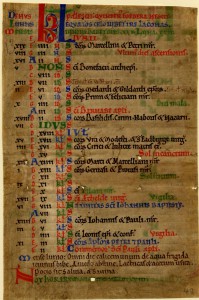 when he chanced upon some priests making the preparations for Palm Sunday while visiting a neighboring town. He hastened home and, summoning his flock, explained why fasting and penitence would be brief this year:
when he chanced upon some priests making the preparations for Palm Sunday while visiting a neighboring town. He hastened home and, summoning his flock, explained why fasting and penitence would be brief this year:
“Know this,” he explained. “Lent was slow this year due to the bad weather, and could not make the difficult journey over these mountains. Therefore, Lent approaches with a slow and weary step so that he brings now nothing more than a single week with him, with the remnants left along the road. In the limited time in which he will remain with you, confess all, and perform penitence.”
 It is easy to sympathize with the priest when you look at one of the medieval calendars from our collections. They feature a complicated grid that coordinates four Interlocking cycles, enabling clerics to know when to celebrate the many moveable feasts of the liturgical year. On the far left in dark brown pigment there is a column of roman numerals running from i-xix. These are called the golden numbers, and indicate where a year falls the nineteen-year Metonic cycle. The cycle was named for the fifth-century Greek astronomer who discovered that the solar cycle has the same relationship to the lunar cycle every nineteenth year. The phases of the moon would occur on the same days in years with the same golden number. Incidentally, if you want to know the golden number for any year, all you do is divide the year by 19. The remainder + 1 gives you a year’s golden number. (The reason you need to add 1 is because the years are calculated from 1 BC.) The second column, with letters A-G, is used to find the dominical letter. The dominical letter was determined by the first Sunday of the new year. If it fell on January 1, the dominical letter for that year would be “A.” If it fell on January 2, it would be a “B.” on down to January 7. Since Sunday was on January 4 this year, the dominical letter for 2015 is “D.” Once you determined the golden number and the dominical letter, you could figure out the date of Easter, which occurred on the first Sunday after the first full moon after the vernal equinox.
It is easy to sympathize with the priest when you look at one of the medieval calendars from our collections. They feature a complicated grid that coordinates four Interlocking cycles, enabling clerics to know when to celebrate the many moveable feasts of the liturgical year. On the far left in dark brown pigment there is a column of roman numerals running from i-xix. These are called the golden numbers, and indicate where a year falls the nineteen-year Metonic cycle. The cycle was named for the fifth-century Greek astronomer who discovered that the solar cycle has the same relationship to the lunar cycle every nineteenth year. The phases of the moon would occur on the same days in years with the same golden number. Incidentally, if you want to know the golden number for any year, all you do is divide the year by 19. The remainder + 1 gives you a year’s golden number. (The reason you need to add 1 is because the years are calculated from 1 BC.) The second column, with letters A-G, is used to find the dominical letter. The dominical letter was determined by the first Sunday of the new year. If it fell on January 1, the dominical letter for that year would be “A.” If it fell on January 2, it would be a “B.” on down to January 7. Since Sunday was on January 4 this year, the dominical letter for 2015 is “D.” Once you determined the golden number and the dominical letter, you could figure out the date of Easter, which occurred on the first Sunday after the first full moon after the vernal equinox.
The next column is the Julian calendar, which the Middle Ages inherited from Rome. The roman numerals in the 3rd column indicate how many days before Kalends, Nones, or Ides a day falls. This information was less functional, and may be merely a relic from Roman calendars that outlasted their usefulness. It could have been used for the sanctorale, or cycle of Saints’ days, which fell on fixed dates and were not reckoned from the date of Easter.

Lastly the column on the far right records the records the feast day to be celebrated that day. Each phrase begins with a decorated initial, usually an “s” for sancti, meaning “of saint…” The color of the initial serves more than a decorative purpose. The common dark brown pigments was used for common feasts. Whereas red or blue indicated that the feast was to be accompanied by more fanfare. In the calendar below, from late twelfth-century England, you can see that the last day of the octave of Ascension, the feast day of Saint Barnabus, the apostle, the sun’s entrance into cancer, the feast day of St. Aethelthryth, and the commemoration of the Apostle Paul are all given special distinction. Most astronomical information is recorded in green pigment.
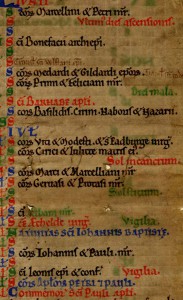
Book historians are particularly interested in this column because it can provide information about the community who made and/or used the book. The addition or erasure of saints can also provide information about the dating of the manuscript.
The science of reckoning time, or computus, was a university subject in itself. Luckily for us, it resulted in some very attractive results. You can enjoy these calendar pages even if, like the hapless priest of Bracciolini’s story, you find computus all a bit of a bother.
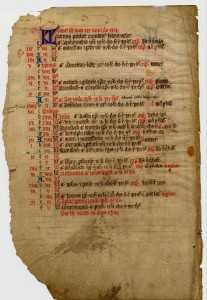 A late 14th- or early 15th century calendar for the month of June
A late 14th- or early 15th century calendar for the month of June
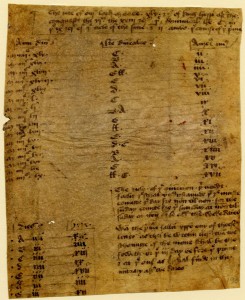 Mid-15th century calendar with notes on calculating the date for Easter
Mid-15th century calendar with notes on calculating the date for Easter
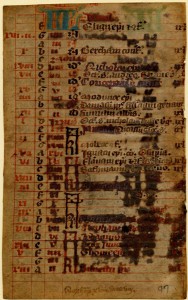 14th century Irish calendar for the month of December
14th century Irish calendar for the month of December
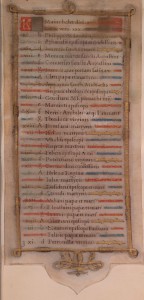 Calendar for the month of may from an early 16th-century French book of hours
Calendar for the month of may from an early 16th-century French book of hours











